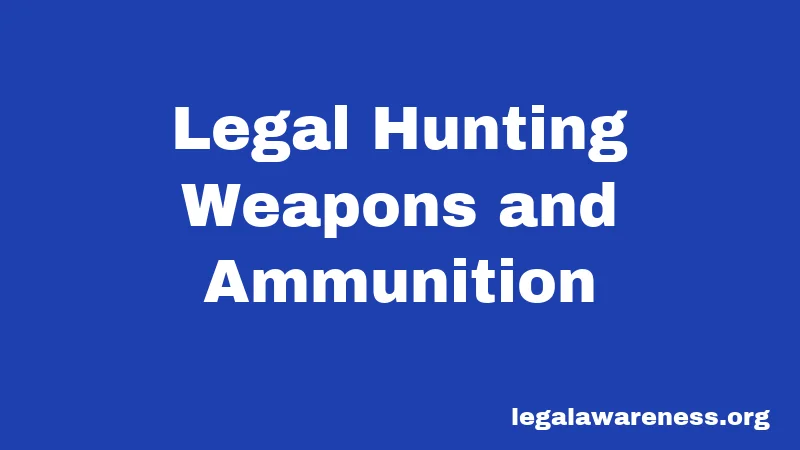New Jersey Hunting Laws in 2026: Your Complete Garden State Guide
Most people have no idea how strict New Jersey’s hunting rules actually are. Seriously. The state takes wildlife protection seriously, and the penalties can hit hard if you don’t follow the rules. This guide breaks down exactly what you need to know before you head into the woods.
New Jersey offers amazing hunting opportunities across 800,000 acres of public land. Whether you’re after deer, turkey, or small game, there’s something for everyone. But first, you’ve got to understand the laws. Let’s walk through them together.
What Is Hunting in New Jersey?

In New Jersey, hunting means pursuing, shooting, or capturing wildlife on public or private land. You can hunt deer, turkey, small game like rabbits and squirrels, waterfowl, and furbearers like raccoons and foxes. But here’s the thing: every single activity requires a valid license and specific permits.
The state divides hunting into different seasons based on what animal you’re hunting. Each season has different dates, bag limits (the number of animals you can take), and weapons you can use. Think of it like having different rules for different sports. Get the rules for your specific hunt before heading out.
Do You Need a Hunting License?
Yes. Period. You need a hunting license to hunt anything in New Jersey. The only exception is if you’re a farmer hunting on your own farm—even then, you still need to report your harvest.
Here’s what licenses cost:
Resident licenses run $18 per year. Non-residents pay $84. Sounds like a lot? Trust me, it’s worth it because the penalties for hunting without one are serious.
The really cool part? If you’re brand new to hunting, you can get an Apprentice Hunting License. This lets you learn without needing Hunter Education certification first. You get two per type throughout your lifetime. This is perfect for introducing friends or family to the sport.
Basic Hunting Licenses and Permits

What license do you need?
All hunters must carry a valid hunting license while in the field. Your license must be displayed on your outer clothing where it’s visible. No hiding it in a pocket—it needs to be obvious.
New hunters have one requirement: Hunter Education certification. You take a course, pass a test, and you’re good to go. The Apprentice License gets around this if you’re new, but eventually you’ll want to take the course anyway.
How about deer hunting specifically?
Deer hunting is more complicated because New Jersey divides the state into different Deer Management Zones (DMZs). Your zone determines your season dates and bag limits. Some zones are more generous than others.
To hunt deer, you need a valid hunting license plus a deer tag. Buck tags (for male deer) cost $21. Antlerless tags (for female deer) cost just $5. Different seasons require different permits—bow permits, shotgun permits, and muzzleloader permits all cost extra.
What about turkey hunting?
Turkey permits cost $10 for adults. Youth tags are free if you apply. Spring turkey season is the main opportunity (fall season is currently closed statewide). Period A runs April 20-24, 2026. Period B runs April 27-May 1, 2026.
There are also special periods for different hunting methods, so check your specific zone before heading out.
Season Dates and Hunting Seasons
Okay, here’s where it gets interesting. New Jersey has tons of hunting days throughout the year. Stay with me here—these dates matter.
Deer hunting seasons (2025-2026):
Fall bow season runs September 13-October 31, 2025 (dates vary by zone). Youth Archery Day is September 27, 2025. The famous six-day firearm season runs December 8-13, 2025. Permit shotgun and muzzleloader seasons happen throughout fall and winter.
Winter bow season is January 1-February 21, 2026. Honestly, this is the part most people miss—there are literally over 100 days of deer hunting available if you use different weapons and zones.
Turkey hunting:
Spring youth hunt runs April 19-25, 2026. Spring general season runs April 26-May 23, 2026. Fall archery (limited areas only) is September 20-26, 2025.
Small game hunting:
Rabbit and squirrel season: October 1-February 28, 2026. Ruffed grouse and woodcock: October 1-November 30, 2025. Quail and pheasant: October 1-January 31, 2026.
Note: Small game hunting on Sundays is prohibited. So don’t show up with your shotgun on a Sunday morning expecting to hunt rabbits. You’ll get caught.
Waterfowl and migratory birds:
Early teal season: September 6-27, 2025. Regular duck season: November 15-January 31, 2026 (zones split). Goose season: November 22-January 31, 2026.
Not sure which zone you’re in? Check the NJDEP Fish & Wildlife website. They have interactive maps showing exactly where your zone is. Don’t guess—look it up.
Legal Hunting Weapons and Ammunition

Here’s what you can use—and what you absolutely cannot.
For deer:
Bow and arrow are legal. Shotguns with slugs or buckshot work. Muzzleloaders using black powder (not smokeless powder) are allowed. Here’s the thing: centerfire and rimfire rifles are NOT allowed for deer hunting. This catches a lot of out-of-state hunters off guard.
Crossbows are permitted during archery seasons. You’ll need draw weight of at least 75 pounds. Arrows must be at least 20 inches long for deer.
For other game:
Rifles are fine for small game. Shot size can’t be larger than #4, except for waterfowl, woodchuck, and coyote. Shotguns are limited to holding three shells at a time (except during Canada goose season).
Air guns are legal for rabbits, hares, and squirrels if they’re .177 to .22 caliber and produce at least 600 feet per second velocity.
What you absolutely cannot use:
Poison, drugs, or explosive tips are banned. Drones for hunting or scouting are illegal. Silencers are not permitted. Electronic ignition systems for muzzleloaders? Nope.
Sound complicated? It’s actually not. Basically, use traditional hunting weapons. Everything else is pretty much off limits.
Ammunition and Ammunition Requirements
You must use the right ammo for the right game. Seriously, this matters.
For deer:
Only shotgun slugs or buckshot in shotguns. Black powder or approved substitutes in muzzleloaders. No centerfire or rimfire rifles.
Key rule: While hunting with a shotgun, you cannot have any unauthorized ammunition in your possession. Not in your pack, not in your truck, nowhere. Get caught with the wrong ammo type, and you’re looking at a violation.
Non-toxic requirements:
Waterfowl hunting requires non-toxic shot. This means no lead. It’s for environmental protection, and the law is strict about this one.
Safety Zones and Distance Requirements
Okay, this one’s important. Pay attention.
New Jersey has “safety zones” where you simply cannot hunt with firearms. These exist to protect people in buildings and around schools.
The 450-foot rule:
You cannot carry a loaded firearm within 450 feet of any building (occupied or not) or a school playground. This includes unoccupied buildings. Even if a house looks empty, if it’s still standing, you stay 450 feet away.
For bow hunters:
You can get closer to buildings—150 feet is okay. But you have to be in an elevated position shooting downward. This prevents arrows from traveling toward people on the ground.
Why does this matter?
Breaking these rules can land you with fines up to $200 for a first offense or $500 for a second. Plus, you’re risking someone’s safety. Don’t hunt near buildings unless you have written permission from the property owner.
Wondering if a building counts? If it looks like someone could live or work there, assume it’s off-limits. When in doubt, move farther away.
Bag Limits and Harvest Reporting
Bag limits are how many animals you can legally take in a season. These vary by zone and weapon type. And here’s the critical part: you must report every single deer you harvest.
Deer harvest reporting:
You need to report every deer within a specific timeframe using the Automated Harvest Report System (AHRS). This goes online or by phone. If you can’t access the system on the day of harvest, call your local NJDEP Fish & Wildlife office immediately.
This isn’t optional. Failing to report is a violation. Period.
What about other animals?
Bag limits for turkey, small game, and waterfowl vary by season and location. Check your specific zone’s regulations before hunting.
Many hunters don’t realize they’ve gone over bag limits until it’s too late. Know your limits before the hunt starts. It’s that simple.
Trespassing and Private Property Rules
Here’s a reality check: most land in New Jersey is private. And if you hunt on private land without permission, you’re committing trespass.
Trespassing while hunting is actually a criminal offense. It’s called “defiant trespass” and it can result in up to 30 days in jail, probation, and a fine up to $500.
What counts as private property?
Any land that isn’t public. If a property owner has posted “No Trespassing” signs, fenced the property, or told you directly to stay out, you cannot hunt there. Period.
Public Wildlife Management Areas (WMAs) are free to hunt on without permission. Many state parks and forests are also open. Check the NJDEP website for a list of open public lands in your area.
Not sure if land is public or private? Contact the property owner or check local records. Trust me, it’s easier than dealing with a trespassing charge.
Prohibited Hunting Practices and Methods
New Jersey bans several hunting methods. Make sure you’re not doing any of these.
No hunting from vehicles:
You cannot shoot from a vehicle. Period. Your firearm must be unloaded and in a case when traveling. Loaded guns in vehicles = serious criminal charges.
No using lights to hunt:
Using artificial lights to hunt most wildlife is illegal. Exceptions: raccoon and opossum hunting is allowed with lights in certain situations.
No hunting on roads:
You cannot discharge a firearm or shoot an arrow from or across any road or highway. This is a safety measure, and violations mean fines.
No baiting near buildings:
Baiting deer is legal, but you cannot hunt within 300 feet of a baited area if you’re in a tree stand or structure.
No hunter harassment:
It’s illegal to intentionally interfere with someone else’s lawful hunt. Making noise to scare wildlife away? That can result in $100-$500 in fines.
Penalties and Consequences for Hunting Violations
Okay, this is serious stuff. The penalties in New Jersey are real, and they escalate quickly.
Civil violations (minor infractions):
Hunting without a license: $10 penalty. Violating bag limits: $25-$50. These won’t result in jail time, but they go on record.
More serious civil violations:
Hunting without proper permits: up to $200 for a first offense, $500+ for repeat offenses. Possessing more wildlife than allowed: fines up to $1,500 for repeat violations.
Damage to crops or property:
If you damage cultivated crops, orchards, fences, buildings, or livestock while hunting, you face fines up to $2,000 plus restitution (payment to the property owner). You also lose hunting privileges for five years.
Sounds harsh? It is. But there’s a reason: you’re responsible for your actions on someone else’s land.
Safety zone violations:
Hunting within 450 feet of buildings: $100-$200 for first offense. Repeat violations: $200-$500. Get caught twice within five years? Expect higher penalties and possible license revocation.
License suspension and revocation:
Two separate fish and wildlife convictions within five years means you lose hunting privileges for two to five years. That’s right—your license gets suspended, and you can’t hunt or fish during that period.
Criminal charges:
Breaking certain rules can result in actual criminal charges. Carrying a firearm improperly (not unloaded in a case) is a serious offense. Unlawful possession of a firearm can mean jail time up to 10 years and fines up to $150,000.
Hunting while your license is suspended? That’s criminal. Selling wildlife? Criminal. These aren’t civil violations—these are criminal offenses.
Special Circumstances and Exceptions
Some situations have special rules. Here’s what you need to know.
Apprentice hunters:
Apprentice licenses are lifetime limited to two per type. You can hunt while learning without Hunter Education certification. But eventually, take the course and get a regular license.
Farmers and landowners:
Farmers don’t need a license to hunt on their own property, but they still must report harvested deer. Property owners can hunt on their own land without permission, obviously.
Youth hunters:
New Jersey has special youth hunting days. Youth Archery Day is September 27, 2025. Youth Pheasant Days run November 1-7, 2025. Youth Firearm Day is November 22, 2025. These days have relaxed regulations to encourage young hunters.
Commercial shooting preserves:
Private commercial ranges allow hunting for certain species like pheasant and quail. You can hunt there even on Sundays if you have the proper license for that preserve.
Interstate Wildlife Violator Compact:
Here’s something important: New Jersey shares hunting violation information with other states through the Interstate Wildlife Violator Compact. If you get a violation in New Jersey, other states can suspend your license too. Not just in New Jersey—across multiple states.
Getting Your Licenses and Permits
Here’s how to get started legally.
Where to buy licenses:
Online at NJFishandWildlife.com. At any licensed vendor throughout the state. Licenses sell starting December 1st each year for the upcoming season.
What you need:
A valid ID. Your hunting license information. Some permits sell out (like deer permits in popular zones), so buy early.
Deer permit system:
Deer permits for Permit Bow, Permit Shotgun, and Permit Muzzleloader seasons go on sale September 8-28 each year. They’re zone-specific, and many zones limit how many permits sell.
Popular zones? They fill up fast. If you want to hunt a specific zone, apply on day one. Don’t wait around.
Turkey permits:
Turkey permits require applications. Some periods fill quickly. Apply as soon as the window opens. Spring periods are more popular than fall, so expect competition.
Federal waterfowl stamps:
If you’re hunting ducks or geese, you need a Federal Duck Stamp in addition to your state hunting license. This is a federal requirement, not just New Jersey.
Safe Hunting Practices
Beyond the laws, safe hunting saves lives.
Always wear orange:
Safety orange vests, hats, and clothing make you visible to other hunters. Seriously, make yourself noticeable. Deer can’t see orange the way humans do, but other hunters can.
Never hunt alone:
Always have a hunting partner who knows where you are. Someone who can help if you get injured and can contact emergency services.
Tell someone your plan:
Let a family member know where you’re hunting, what time you’re leaving, and when you’ll be back. This is simple but life-saving.
Know your target and what’s beyond:
Before you shoot, know exactly what you’re aiming at and what’s beyond your target. A missed shot or ricochet can travel hundreds of yards.
Keep your firearm pointed in a safe direction:
Never point a loaded firearm at anything you don’t intend to shoot. Not even as a joke.
Resources and Where to Get Help
Need more information? Here’s where to look.
NJDEP Fish & Wildlife:
Visit dep.nj.gov/njfw for official regulations, season dates, and zone maps. This is your primary source for accurate, up-to-date information.
Wildlife Management Area maps:
Download the NJ Wildlife Management Area Explorer app to find public hunting lands with maps and detailed information.
Hunter Education courses:
Take a course through licensed instructors. Contact your regional NJDEP office for class schedules and locations.
Law enforcement assistance:
Unsure about a regulation? Call your regional NJDEP Fish & Wildlife Law Enforcement office:
Northern Region: (908) 735-8240 Central Region: (609) 259-2120 Southern Region: (856) 629-0555 Marine Region: (609) 748-2050
Report violations:
See someone breaking the rules? Call Operation Game Thief at (855) OGT-TIPS. It’s anonymous, and your report helps protect the resource.
After business hours, call the DEP Action Line at (877) WARN-DEP or (877) 927-6337.
Frequently Asked Questions
Do I need Hunter Education to hunt in New Jersey?
New hunters usually do, unless they’re using an Apprentice License. Take an approved course and pass the test. It’s straightforward.
Can I hunt on Sunday?
Most hunting on Sunday is prohibited. Exceptions: bow hunting for deer on private land, raccoon hunting Sunday mornings only, and hunting on licensed commercial preserves.
What happens if I accidentally go over my bag limit?
You’ve violated the law. Report it immediately to NJDEP. Intentionally going over? Expect fines up to $1,500 and possible license suspension.
Can I hunt on public land without permission?
Wildlife Management Areas are open to licensed hunters without written permission. Check NJDEP for a list of open public lands. Most private land requires permission.
What if I’m from another state? Are the rules different?
Nope. Non-resident hunters follow the same rules as residents. You pay more for licenses but follow identical regulations.
Do I need a permit for every type of hunting?
No, but many do. Basic small game just needs your hunting license. Deer hunting requires tags. Turkey hunting requires a permit. Check your specific game species before heading out.
Final Thoughts
New Jersey’s hunting laws are detailed, but they exist for good reasons. They protect wildlife populations, keep hunters safe, and ensure fair access to hunting opportunities for everyone.
Here’s the bottom line: get your license, know your zone, respect the seasons, and hunt safely. Take the time to understand the rules before you go. They’re not meant to discourage you—they’re meant to keep you, other hunters, and wildlife safe.
Now you know the basics. Stay informed, hunt responsibly, and when in doubt, call your local NJDEP Fish & Wildlife office. They’re there to help, not to catch you breaking rules. Enjoy the amazing hunting New Jersey has to offer.
References
- NJDEP Fish & Wildlife – Official Hunting Regulations
- 2025-2026 New Jersey Hunting & Trapping Digest
- New Jersey Deer Hunting Regulations
- General Hunting Regulations – eRegulations
- New Jersey Fish & Wildlife Law Enforcement
- NJ Statutes Title 23 – Fish and Game
- Wildlife Management Areas in New Jersey
- NJ Fish and Wildlife License Sales
